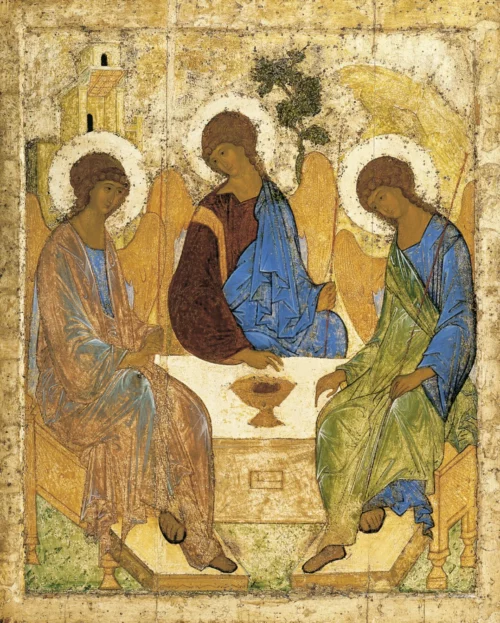Seventeenth Sunday of Ordinary Time, July 24, 2022
(click here to listen to or read today’s scriptures)
Story-telling for all of us
And the Lord said, “The outcry against Sodom and Gomorrah is so great, and their sin so grave, that I must go down and see if what they have done is as bad as I hear. I mean to find out.
The author of Genesis told stories. In chapter 18, three men visit Abraham at his home on the crest of a hill overlooking Sodom. For most Christians these men represent the three members of God’s Trinity: the Father, the Christ and the Holy Spirit.
The story and the painting open my mind and heart. A sermon about the same event would not. Pastor Eugene Peterson creates stories rather than three-point essays. He wants to read stories too, real stories:
One of the most soul-damaging effects of modern life is the obfuscation of story: the fragmentation of story into disconnected anecdotes, the reduction of story to gossip, the dismemberment of story into lists of formulae or rules. In most of the words that come before us each day – delivered via television, internet, newspaper, billboard, and gossip – there is rarely any story beyond the immediate event. There is very little that connects to the past, reaches into the future, or soars to the heights. Instead of connecting us with a deeper reality, such words disconnect us, leaving us in a boneyard of incident and comment.
On the other hand, every time someone tells a story and tells it well and truly, the gospel is served. Out of the chaos of incident and accident, story-making words bring light, coherence, meaning, and value. If there is a story, then maybe, just maybe, there is (must be!) a Storyteller.
What will happen to the sinners in Sodom?
When the men got up to leave Abraham, they looked down toward Sodom.
The Lord shares his thoughts with Abraham, and Abraham attempts to bend his plan toward mercy. Will you spare the city for the sake of 50, or of 45, or of 40, 30, 20, 10?
For the sake of those ten, I will not destroy it.
Abraham sees in his visitor (the Lord of the universe) the merciful face of God. Fr. Thomas Keating wrote near the end of his life of the mercy of God and the peace of the world that God inhabits, whether we choose to or not:
When we have lost every symbol that we thought would bring us peace (reputation, income, portfolio, entertainment, acceptance, success, profession, ministry, for example) … God joins us at this point of utter powerlessness in our anguish, alienation and self-made hell which, when we cease projecting it on to others, we cannot help but face within ourselves.
And in doing so, we find the world that is. This is the world in which the power of God is totally at the service of infinite mercy, in which God takes upon Himself our anguish, desolation, and loneliness, the hellishness of which hell itself is the symbol. This brings peace that is total gift, the peace that our world cannot give.
Jesus never stops telling stories. His pictures are rich with familiar faces and experience.
Which father among you would hand his son a snake when he asks for a fish?
Or hand him a scorpion when he asks for an egg?
If you then, who are wicked, know how to give good gifts to your children, how much more will the Father in heaven give the Holy Spirit to those who ask him?
Sitting around the campfire telling stories into the darkness, we quickly turn to Jesus. God is the best story-teller.
(Genesis 18, Psalm 138, Colossians 2, Romans 8, Luke 11)
(posted at www.davesandel.net)
#
